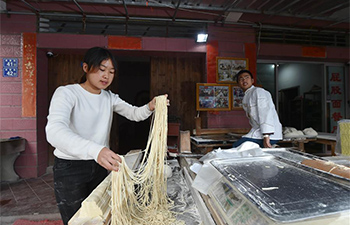WASHINGTON, Jan. 4 (Xinhua) -- A gene therapy approach that reprograms other cell types into functional beta-like cells could be a promising new option for the treatment of diabetes, a new study suggested Thursday.
In mice with type 1 diabetes, the treatment can lead to normal blood glucose levels for an extended period of time, said the study in the U.S. journal Cell Stem Cell.
"A clinical trial in both type 1 and type 2 diabetics in the immediate foreseeable future is quite realistic, given the impressive nature of the reversal of the diabetes," senior study author George Gittes of the University of Pittsburgh School of Medicine said in a statement.
Type 1 diabetes is a chronic disease in which the immune system attacks and destroys insulin-producing beta cells in the pancreas, resulting in high blood levels of glucose.
In patients with the disease, beta-cell replacement therapy is likely doomed to failure because the new cells might fall victim to the same autoimmunity that destroyed the original cells.
Researchers at the University of Pittsburgh School of Medicine used an adeno-associated viral (AAV) vector to deliver to the mouse pancreas two proteins, Pdx1 and MafA, which reprogrammed plentiful alpha cells into functional, insulin-producing beta cells.
They theorized that the functional beta-like cells are distinct from beta cells and therefore are not recognized or attacked by the immune system.
It turned out that this approach restored normal blood glucose levels in diabetic mice for about four months, and that the new insulin-producing cells derived almost exclusively from alpha cells.
"The viral gene therapy appears to create these new insulin-producing cells that are relatively resistant to an autoimmune attack," said Gittes. "This resistance appears to be due to the fact that these new cells are slightly different from normal insulin cells, but not so different that they do not function well."
One major concern was that the mice did eventually return to the diabetic state, suggesting that this treatment would not represent a definitive cure for the disease.
"The protection from recurrent diabetes in the mice was not permanent, although some studies would suggest that processes in mice are highly accelerated, so four months in mice might translate to several years in humans," Gittes said.
Currently, the researchers are testing their approach in primates.
"If we are able to show efficacy in non-human primates, we will begin work with the U.S. Food and Drug Administration to get approval for the use of this viral gene therapy in diabetic patients, both type 1 and type 2," Gittes said. Enditem

















